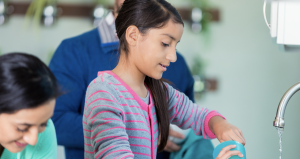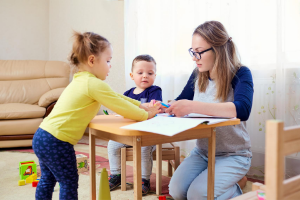From Struggles to Super-Powers: Helping Your Child Grow
 As parents, we have many goals for our child. Overall, these goals are about managing the challenges in their lives, so they can ultimately be happy and successful. These can sound like: “I want him to turn in his homework.” I want her to clean up her room.” “I want her to have friends.” “I want him to learn how to solve problems for himself.” “I want her to be able to regulate her emotions and not yell at us or hide in her room all day.” These are all important and reasonable goals. After all, knowing what you want for your child and helping him get there is the job of parenting. Ideally, each of the hurdles are managed, and things move forward. The problem is when your child stumbles in making progress on these goals.
As parents, we have many goals for our child. Overall, these goals are about managing the challenges in their lives, so they can ultimately be happy and successful. These can sound like: “I want him to turn in his homework.” I want her to clean up her room.” “I want her to have friends.” “I want him to learn how to solve problems for himself.” “I want her to be able to regulate her emotions and not yell at us or hide in her room all day.” These are all important and reasonable goals. After all, knowing what you want for your child and helping him get there is the job of parenting. Ideally, each of the hurdles are managed, and things move forward. The problem is when your child stumbles in making progress on these goals.
Along the way, parents look for and try many strategies. You may look at consequences, thinking that if they are strong enough, the behavior will come into line. This may include intensifying reminders (i.e., nagging), checking over work, or removing privileges. This approach may yield improvement toward getting your child to do what is expected but may also have the unintended consequence of increasing resentment. If progress is not made, frustration rises for both you and your child. As the frustration takes root, things can begin to feel futile. You may feel like a bad parent, and your child may feel, at best, misunderstood and, at worst, like a failure.
The path forward is to shift from trying to get your child to do what is expected to looking at what is getting in their way. This reorientation is important as it redirects your assumption that your child is capable but lacks motivation to exploring challenges behind the behavior. Whether it is about a specific task such as organizing their things, completing steps in a process, or managing the expression of their emotions, your child may not yet have the ability to do these things as expected. The shift from “she should know better” to “she is trying to manage, and doesn’t know how” increases your compassion and decreases the tension as it opens the door to new questions and approaches.
As you begin to look at your child through different eyes, it becomes possible to look for the difficulties in the way of getting things done. Consider visiting out of town relatives as an example of a goal. Embedded in this goal are many steps, including picking a date, figuring out how you’re going to get there, and packing for the visit. Breaking down this goal into steps makes it more doable. However, there are elements that underlie these steps. You may have memories of the last time you visited that colors your motivation. If you had a joyful experience, your motivation is likely to be high as compared to the hesitancy you may feel if your last visit was filled with tension and conflicts. This emotional history may inform how you structure the time you spend with your relative. Health challenges will also have a role in your planning. If you have back issues or a health condition that makes being in crowds a health risk, these considerations must be built into your planning. While the ultimate goal is to travel, working through these process questions guides you in your decision making. When this lens is applied to your child’s ability to complete a task, many variables get unearthed.
Shifting to exploring the challenges that interfere with accomplishing goals is powerful. This shift alone allies you with your child in exploring the processes that are interfering with their ability to meet and master goals. This journey begins with your curiosity, noticing how your child is currently managing.
Looking back at a challenging moment in a neutral way begins the shift to reflection. There are many things to reflect on and learn about; thoughts, emotions, body sensations, and overall health. Any one of these or a combination can make a significant difference in how we manage at any one moment in time. We are complicated beings with lots going on inside. The capacity to reflect is supported by mindfulness, the practice of bringing attention to the moment in a non-judgmental way. This practice of observing and describing in a non-judgmental way helps decrease assumptions and interpretations that often get in the way by escalating tensions.
As with anything new, reflecting and finding words to describe the elements of experience may feel awkward at first, but given time and practice, it gets easier. For us as parents, it opens the door to looking more clearly at ourselves as we reflect on what was going on for us in the moment. Being curious with your child and prompting them to reflect sets the stage for you to listen and them to learn more about themselves. For your child, it opens the door to self-awareness.
Helping your child build self-awareness is a like a super-power. As your child learns to look at what is going on for him when he didn’t turn in his homework or pick-up her room or when she yells at you, the door opens for your child to consider what could have happened differently. Reflection allows you and your child to recast behaviors as a means to manage a problem. This more open perspective helps you look at what works well and what makes things worse. Noticing the difference and the components that underlie each provides lots of information.
By building links between circumstances, emotions, and actions, your child can develop foresight to support planning for future success. This awareness can grow insight to guide behavior the next time they face a similar challenge. The movie Inside Out charmingly depicts the internal world of the “control panel” where emotions assert their influence. Attending to this internal world opens the door to unlock self-compassion, curiosity, creativity, and effective problem-solving.
As the capacity for reflection emerges, growth becomes sustainable and generalizable. In other words, it stops the “whack-a-mole” that parents often experience when one challenge is met, and another emerges. The gift to your child of supporting their access to who they are and what makes them “tick” is rewarding. As they acquire this capacity, they become resourceful and resilient, finding their personal internal levers of drive and self-control. With this broadened perspective, you can see your child’s behavior in a different light and share a loving, patient, and collaborative process as your child learns who they are and what is getting in their way. As a parent, this is holy grail– walking along your child’s side in a warm and connected relationship, supporting them on their journey as they learn to achieve academically, professionally, and interpersonally.
Tags: advice for parent, advice for parents, good parenting, good parenting skills, mindfulness and parenting, parent advice, parenting, parenting advice, parenting during covid-19, parenting problems, parenting skills, parenting tips, parents







